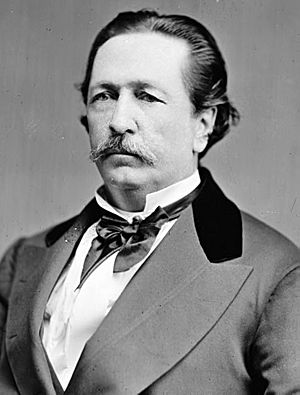Charles E. Hooker facts for kids
Charles Edward Hooker (born April 9, 1825 – died January 8, 1914) was an important politician from Mississippi. He served as a U.S. Representative, which means he helped make laws for the country. He also worked as a lawyer and was involved in the American Civil War.
Contents
Early Life and Education
Charles Edward Hooker was born in Union, South Carolina, on April 9, 1825. He grew up in Laurens District, South Carolina. He went to regular schools there.
After finishing school, he studied law. In 1846, he graduated from Harvard Law School. He became a lawyer in 1848. He then started his law practice in Jackson, Mississippi.
Early Career and Civil War
Hooker began his career as a district attorney. He held this job from 1850 to 1854. In 1859, he became a member of the Mississippi State House of Representatives.
Before the Civil War, Mississippi sent him to South Carolina. This was in December 1860. His job was to discuss Mississippi leaving the United States.
When the Civil War began, Hooker joined the Confederate States Army. He started as a private soldier. He later became a lieutenant and then a captain. He served in the First Regiment of Mississippi Light Artillery. He was eventually promoted to the rank of colonel in the cavalry.
Political Career in Mississippi
After the Civil War, Hooker was elected Attorney General of Mississippi in 1865. However, military authorities removed him and other state officers from their positions that same year.
He was elected Attorney General again in 1868. After this, he went back to practicing law in Jackson, Mississippi.
Serving in Congress
First Time in Congress
Charles Hooker was elected to the U.S. House of Representatives. He was a member of the Democratic Party. He served four terms, from March 4, 1875, to March 3, 1883.
During his time in Congress, he stood out for some of his views. He had supported the Confederacy, but he opposed certain types of racial discrimination. For example, he spoke against efforts to stop Chinese people from moving to the U.S.
He also had unique views about the changes after the Civil War. He said that former slaves had become "full-fledged American citizens." He believed they had all the rights and duties of a free American.
Views on Native American Policy
Hooker was also one of the few politicians to criticize the U.S. government's Native American policy. The government wanted to break up Native American tribes. They also wanted to divide tribal land into individual plots. This was called "allotment."
Hooker believed that allotment would cause Native Americans to lose their land. He thought they would lose it through "fraud, force, or violence." His concerns proved true. The Dawes Act of 1887 brought these changes. Between 1887 and 1934, Native Americans lost 86 million acres of land.
Later Terms in Congress
Hooker was elected to Congress again. He served another four terms, from March 4, 1887, to March 3, 1895.
He was elected one more time to Congress. This last term was from March 4, 1901, to March 3, 1903.
Later Life
After his final term in Congress, Charles Hooker continued to practice law. He worked in Jackson, Mississippi. He passed away on January 8, 1914. He was buried in Greenwood Cemetery.


